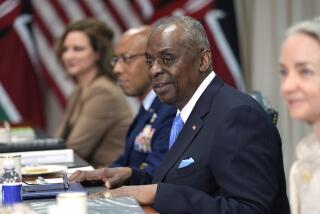Marshall Given Pacemaker in Heart Operation : Supreme Court: The retiring justice is ‘in good spirits’ following the surgery, a hospital official says. The device will treat a slow heart rate.
WASHINGTON — Retiring Supreme Court Justice Thurgood Marshall was “resting comfortably and in good spirits” Saturday after surgery to implant a pacemaker, a spokesman for the National Naval Medical Center said.
“The pacemaker is functioning as expected,” hospital spokesman Lt. Cmdr. Bill Clyde said in a written statement announcing the surgery.
The device was implanted Friday afternoon “to treat an abnormally slow heart rate,” Clyde said.
“Justice Marshall is resting comfortably and in good spirits,” he added in a telephone interview.
Clyde said Marshall, 83, had remained “awake during the procedure and tolerated it well.”
He did not say when Marshall, who has been hospitalized since Wednesday after complaining of lightheadedness, would be released.
Marshall, the court’s only black member, said in June that his health was a factor in his decision to retire from the court after 24 years.
“My doctor and my wife and I have been discussing this for the past six months or more. And we all eventually agreed, all three of us, that this is it, and this is it,” Marshall told reporters at a news conference then.
He told reporters who asked for details about his health: “I’m old. I’m getting old and coming apart.”
Marshall suffered a heart attack in 1976, has had bouts of pneumonia and bronchitis and was hospitalized in 1987 with a blood clot in his right foot and in August, 1990, after a fall in Chicago.
Marshall rose to national prominence when he argued before the high court as the lead attorney for the National Assn. for the Advancement of Colored People in the 1954 decision that outlawed segregation in public schools. He was appointed to the court by President Lyndon B. Johnson in 1967.
During his tenure, Marshall also has championed abolition of the death penalty and been a staunch defender of the court’s 1973 decision that legalized abortion.
More to Read
Sign up for Essential California
The most important California stories and recommendations in your inbox every morning.
You may occasionally receive promotional content from the Los Angeles Times.









